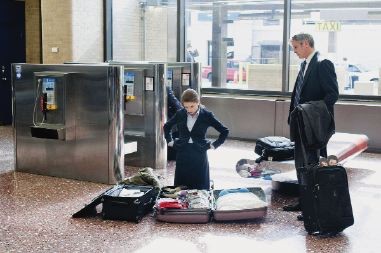Up in the Air

"We are not swans,” declares Ryan Bing ham (played by George Clooney), summing up human nature to a crowded conference room. “We’re sharks.”
The line comes about midway through Up in the Air, the latest picture from Jason Reitman (Thank You for Smoking, Juno), and the claim also sits at the center of the film’s feast of ideas. Calvin said all wisdom consists of two endlessly interconnected parts: the knowledge of God and the knowledge of ourselves. Up in the Air is a meditation on the latter, and it is one of the most intriguing films of the year.
Bingham’s claim is that human beings are not meant to settle down with one partner, like swans, but rather to constantly move on, like sharks. Sharks are also killers, of course, and though this is not Bingham’s primary point, the predatory implication is clear enough.
He should know. Bingham is a “career transition” counselor, which means he is hired by downsizing companies to come in for a day, deliver the devastating news to the downsized and move on. For him, business is booming: one person’s Great Recession is another’s Great Oppor tunity. As Bingham’s boss (Jason Bateman) puts it to his staff, smooth as sharkskin, “This is our moment.”
Indeed, Up in the Air is a movie of the moment. At a time of job loss levels not seen in decades, it’s a film about the moral, cultural and economic arrangements that make such losses possible and the human havoc they inevitably wreak. In an inspired move, Reitman seamlessly weaves in footage from interviews with Americans who have actually recently been laid off and who now articulate what they said—or wish they had said—to those who fired them. This is their moment, and they speak with raw emotion and insight.
But Reitman does not paint with a black-and-white brush; this is no Michael Moore–style screed. Instead, the film is luminous with rich, ambivalent shades of grey. Bingham, for example, understands his work as a kind of shark’s ministry, an attempt to provide as much dignity as the humiliating situation will allow. He is a master salesman, and as he persuades one man that losing his job is a chance to finally pursue his lifelong dream of becoming a chef, the pitch is at once phony and compassionate.
Bingham’s particular brand of honor among thieves comes into sharp relief in relation to two women. The first is Natalie (Anna Kendrick), a young up-and-comer at the company who envisions doing their work via teleconference, a plan that will effectively ground Bingham’s airline-mileage-seeking life style.
The second woman, Alex (Vera Far miga), shares his lifestyle and moral sensibility, but their relationship prompts a transformation. “Isolated? I’m surrounded,” Bingham used to insist, strolling through a busy airport terminal. But as he begins to fall for Alex, the idea dawns on him that he just might be a swan after all.
Reitman is too adept a filmmaker to let this scenario play out predictably, and the direction the story takes is one of the film’s many revelations. Suffice it to say that Reitman is brilliantly alert to the paradoxical features of human relationships and in particular to how we can feel alone in a crowded room.
Christian witness would say we are swans, not sharks, and that accordingly, “it is not good for humanity to be alone” (Gen 2:18). We are made for faithful, loving, enduring relationships with God and with each other, not for isolation, predation and lives of merely moving on.
Bingham’s world is a place where loyalty has been crassly commercialized, removed from the realm of family, friendship and workplace and relocated in the realm of, say, accumulated air miles.
“We appreciate your loyalty,” intones the airline representative, with chilling sincerity. Whether our deepest fidelities will be oriented to corporate clubs or to God and neighbor is one way of framing a question of our time that is very much up in the air.




